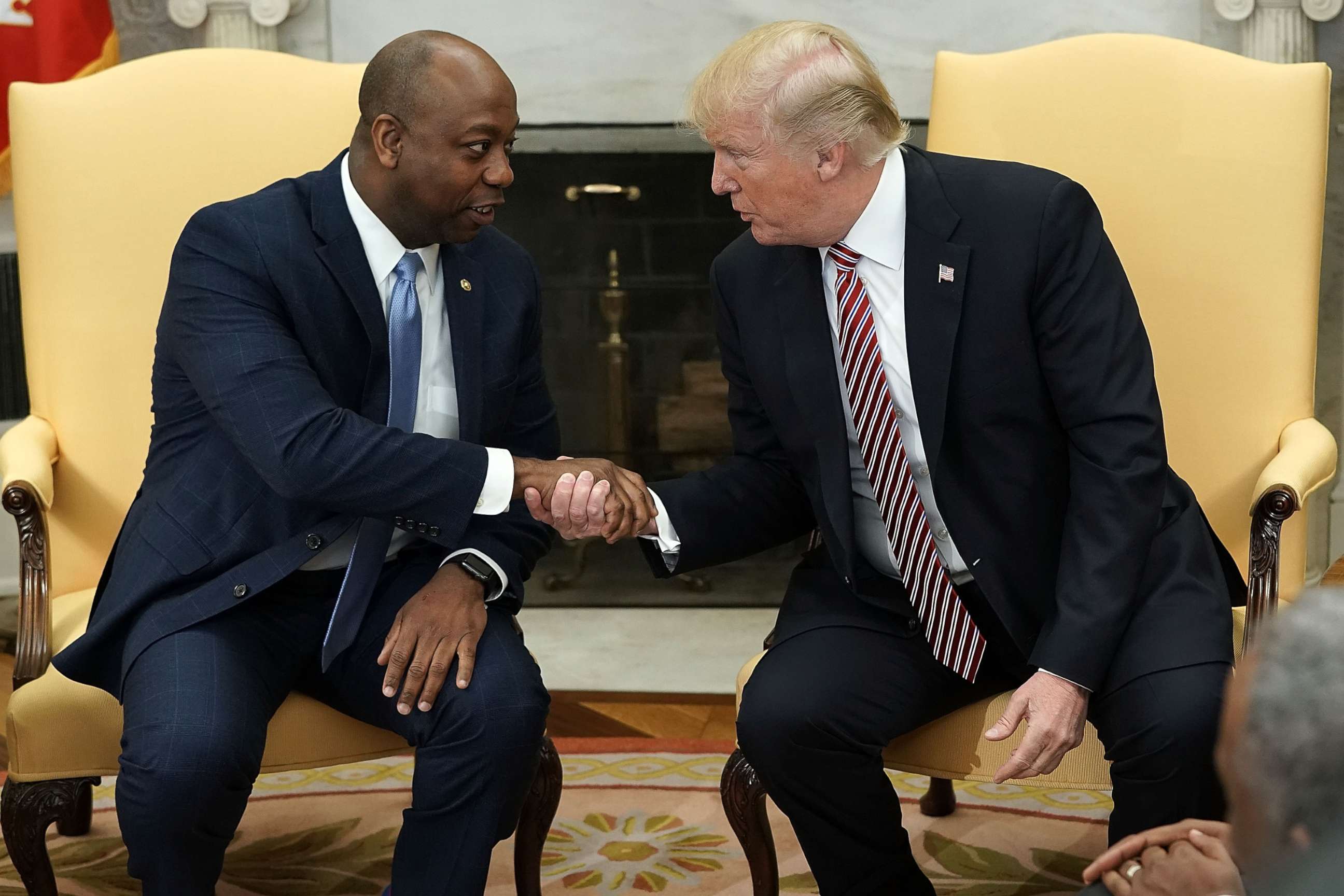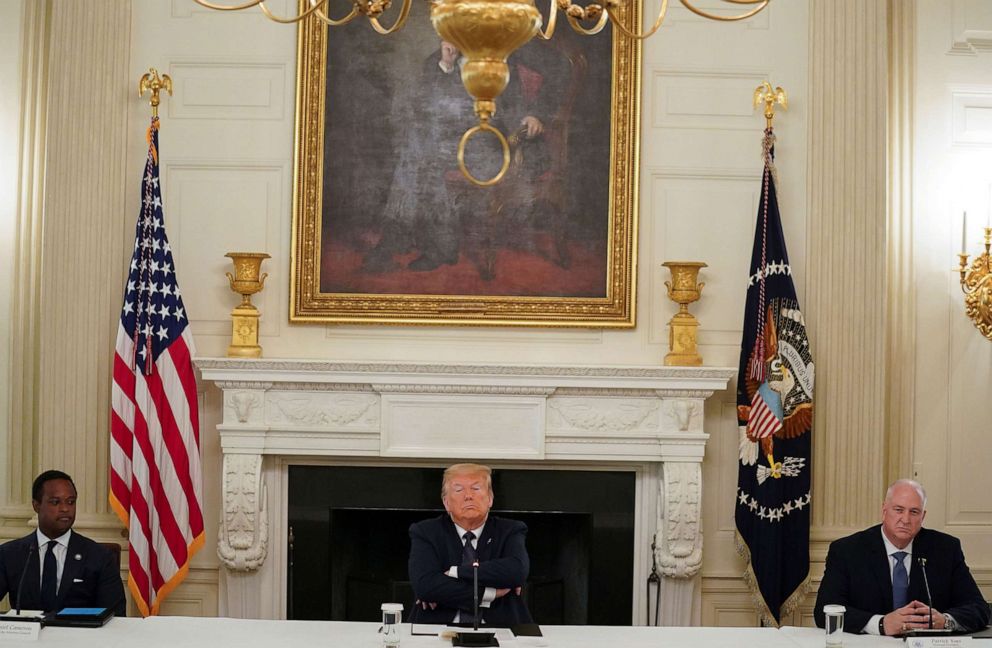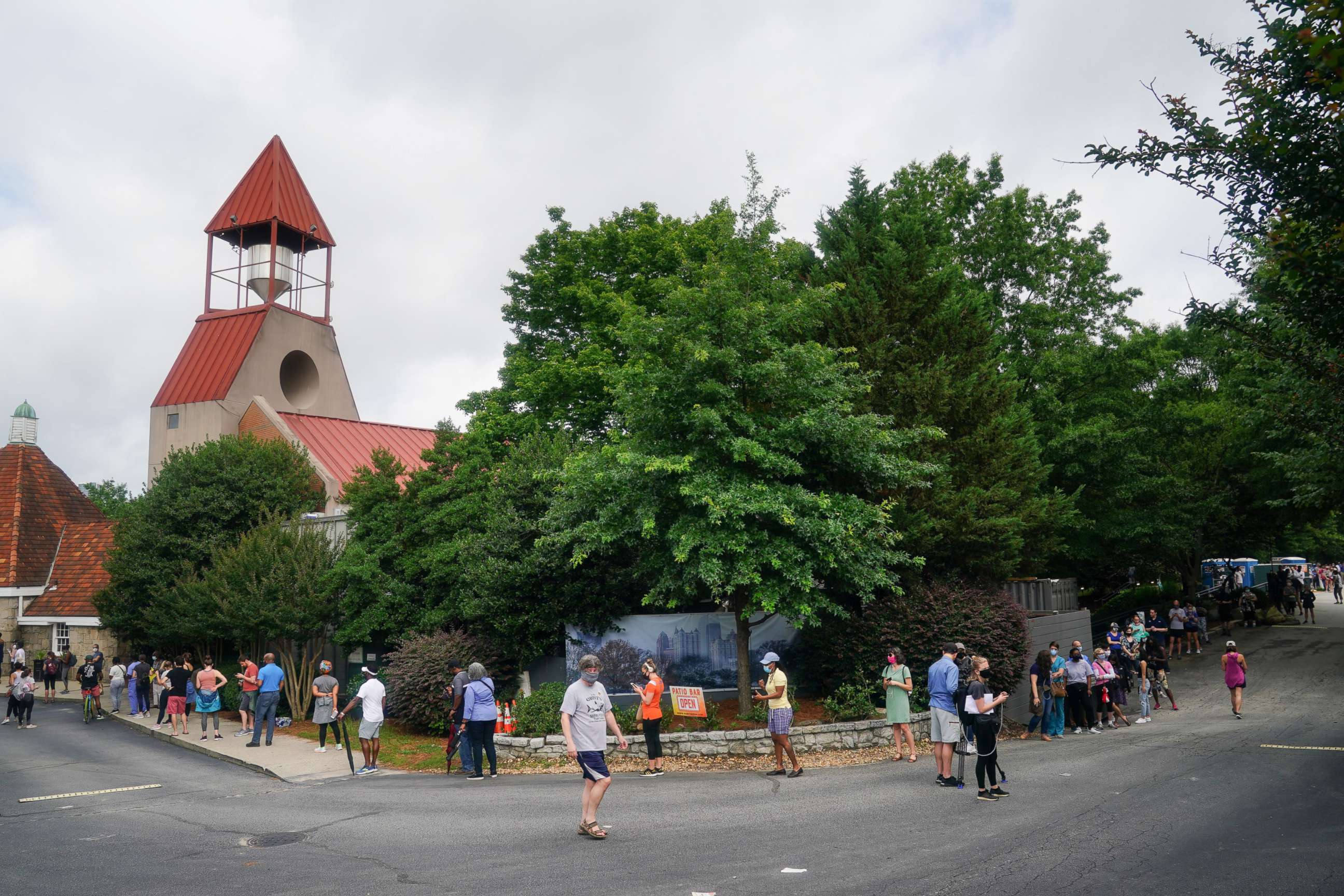The Note: GOP seeks to drag reluctant Trump to action on race
Trump’s recent tweets include unfounded allegations about an injured protester
The TAKE with Rick Klein
President Donald Trump's control of the Republican Party is being tested -- by Republicans, and not the never-Trump kind.
GOP concern over Trump's response to this national moment around race and policing tactics is not playing out, for the most part, in the language Trump knows best. It's not coming via angry tweets or loud denunciations of the president's leadership -- or the lack thereof.
Instead, a remarkable split-screen is playing out that could overtake even Trump's inclination toward "law and order" over police reforms.
Republicans on Capitol Hill are not-so-quietly crafting legislative responses to the issues raised by the killing of George Floyd, while tuning out -- at least for now -- the noise from the White House.

"It's not necessary that we be on the same page on every aspect," Sen. Tim Scott, the Senate's only black Republican and the leader of GOP reform efforts, told reporters Wednesday.
As the president heads to Dallas on Thursday to discuss race relations -- and as he plans a Juneteenth return to the campaign trail next week in Oklahoma -- his public statements don't suggest that he sees the moment the same way as some of his high-profile allies.
Trump's recent tweets include unfounded allegations about a protester injured in a police confrontation in Buffalo, New York, and a declaration that he won't entertain proposals to rename military bases that honor Confederate generals. He's also insulted the few senators who have suggested his response to recent events has fallen short.
But it may be that the search for Republican voices that defy Trump has missed the point. The policy debate playing out shows lawmakers confronting a reality that the president has sought to redefine.
Faced with grim poll numbers, Republicans see getting Trump to agree with them as key to their political turnaround.
The RUNDOWN with MaryAlice Parks
Treasury Secretary Steven Mnuchin said Wednesday that he felt another economic relief package definitely would be necessary to pull the country’s economy out of recession in the wake of the coronavirus shutdowns.
The key questions now: Will members of his own party get on board, will the money get to those most in need and will the relief trickle up to cities across the country with serious budget shortfalls looming?
"I think as we have said, we don't want to rush into that because we want to be both careful at this point in seeing how the money is in the economy. A lot of the money is still not in it. And two, I think we need to be much more targeted at this point," Mnuchin said.
The push for more funds felt counter to the rhetoric from the president and dissonant with the victory lap he tried to take last week when job and unemployment numbers were not as bad as expected.

"You noted in your opening comments that we expect a strong phased recovery in the third and fourth quarter. That there has been substantial cash resources of our consumers, and that we expect a dramatic improvement in quarter three and quarter four. So I'm puzzled by the statement that you make that we're going to need a stimulus to get the economy going again," Sen. Mitt Romney said at the Senate hearing with Mnuchin Thursday.
Lawmakers on both sides of the aisle continued to raise concerns that minority-owned small businesses have struggled to get funds, despite the administration’s efforts to work on this disparity. Congress recently enacted some changes to forgive more of the payroll protection plan funds, but they are debating additional changes with the administration as well.
The push from Mnunchin came the same day as the National Education Association released a new report arguing that “if the economic damage wrought by the coronavirus pandemic isn’t answered with immediate, additional funding for states and localities, the United States is projected to lose 1.9 million education jobs -- approximately one-fifth” public education workforce.
Big picture, any effort to primarily support businesses could be met with skepticism from both sides of the aisle.
The TIP with Alisa Wiersema
Georgia's messy primary election demonstrated a potential catch-22 that both voters and election officials across the country could face ahead of November. Although most Georgians were able to vote safely amid the pandemic by casting mail ballots or voting early, the state's switch to accommodate an unprecedented influx of mail votes weighed into a slew of logistical errors and delays on Tuesday.

While Georgia saw very little litigation leading into Tuesday's elections, on Wednesday, the chair of Priorities USA, Guy Cecil, left the door open on whether potential lawsuits could be expected in the aftermath.
"We haven't made any decisions yet about litigation. We want to make sure that they have time to collect the data over the course of the next week. And then we'll make an assessment about how we can best engage there. But we're certainly not ruling out some sort of litigation or frankly, just other engagement there," he said.
Election officials in Atlanta's Fulton County plan to conduct a post-mortem assessment of what went wrong, and the Secretary of State has opened an investigation into two counties' election processes. Those examinations could provide an updated roadmap for the next big voting day on June 23, which will include the previously litigated New York primary.
ONE MORE THINGOne week ago the Trump campaign's internal poll numbers showed the president down in swing states, and down with key demographics of voters including women and independents. While some of President Donald Trump’s advisers insisted the current campaign internal poll numbers aren’t relevant in gauging his re-election chances this far from November, others among his most loyal and longest serving advisers have developed a new posture: one of increasing alarm. They fear that without a course correction -- and quickly -- Donald Trump could lose the 2020 presidential election. This account of the president and his advisers' struggle to respond to the ongoing crises and the political fallout is based on conversations with 17 sources including White House officials, campaign advisers and sources close to the president.
BRINGING AMERICA BACK
The election failures in Wisconsin, Pennsylvania, Ohio and, most recently, Georgia, do not "bode well for November," said Michael McDonald, an expert on elections and a political science professor at the University of Florida. Some longtime Democratic strategists' concerns for November are more acute after Georgia, which had the most time to prepare for a pandemic primary. Read this story and more by checking out Bringing America Back, an ABC News feature that highlights the day's top stories in economic recovery and medical preparedness amid the coronavirus pandemic.
THE PLAYLIST
ABC News' "Start Here" Podcast. Thursday morning's episode features ABC News Deputy Political Director MaryAlice Parks and ABC News' Jack Date who discuss the testimony of George Floyd's brother on Capitol Hill and where efforts toward police reform may be heading. ABC News Senior Washington reporter Devin Dwyer tells us what voting troubles in Georgia may signal ahead of Election Day in November. And, author and professor Tananarive Due joins the show to examine how Hollywood and the entertainment industry is responding to the national discussion about racial representation. http://apple.co/2HPocUL
ABC News' "Powerhouse Politics" podcast. ABC News Political Director Rick Klein and Chief White House Correspondent Jonathan Karl discuss President Donald Trump's allegation against a 75-year-old protester who was pushed by police in Buffalo, New York, last week during a protest and remains hospitalized. https://bit.ly/2w091jE
WHAT YOU NEED TO KNOW TODAY




